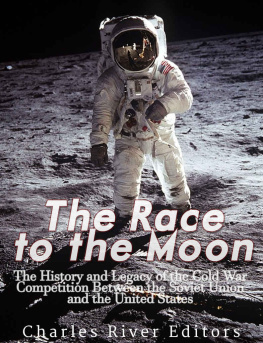Romney Boyd - Red Flag Over the Moon
Here you can read online Romney Boyd - Red Flag Over the Moon full text of the book (entire story) in english for free. Download pdf and epub, get meaning, cover and reviews about this ebook. year: 1958, publisher: Candar Publishing Company, Inc., genre: Non-fiction. Description of the work, (preface) as well as reviews are available. Best literature library LitArk.com created for fans of good reading and offers a wide selection of genres:
Romance novel
Science fiction
Adventure
Detective
Science
History
Home and family
Prose
Art
Politics
Computer
Non-fiction
Religion
Business
Children
Humor
Choose a favorite category and find really read worthwhile books. Enjoy immersion in the world of imagination, feel the emotions of the characters or learn something new for yourself, make an fascinating discovery.

- Book:Red Flag Over the Moon
- Author:
- Publisher:Candar Publishing Company, Inc.
- Genre:
- Year:1958
- Rating:4 / 5
- Favourites:Add to favourites
- Your mark:
- 80
- 1
- 2
- 3
- 4
- 5
Red Flag Over the Moon: summary, description and annotation
We offer to read an annotation, description, summary or preface (depends on what the author of the book "Red Flag Over the Moon" wrote himself). If you haven't found the necessary information about the book — write in the comments, we will try to find it.
Red Flag Over the Moon — read online for free the complete book (whole text) full work
Below is the text of the book, divided by pages. System saving the place of the last page read, allows you to conveniently read the book "Red Flag Over the Moon" online for free, without having to search again every time where you left off. Put a bookmark, and you can go to the page where you finished reading at any time.
Font size:
Interval:
Bookmark:
Red Flag Over the Moon
by Romney Boyd
After Sputnik and Muttnik, what? Science-fiction has been talking about space-flight for years while the politicians goofed. SATURN dares to present a grimly realistic analysis of what the future of space-flight is really going to be.
A mountain of self-deception came crashing down on the heads of the Western world on October 4, 1957, when the ominous beep-beep-beep of a man-made moon came circling the globe. For that satellite, the first actual step in the conquest of outer space, was notas ten thousand science-fiction stories would have had it and as millions of lines of smug newspaper and magazine stories had predictedwas not an American invention.
Only a few weeks earlier Russian claims to having perfected a powerful rocket capable of intercontinental cargo travel (the cargo being, of course, atomic warheads) were pooh-poohed. From the White House on down to the lowliest politicos, the report was greeted with shrugs, smiles of scorn for such obvious poppycock, and jeers that it was mere propaganda. But as it turned out the Soviets were not making scarehead stories, they were coldly stating facts.
They produced a rocket capable of penetrating outer space. They blasted off a miniature globe many times heavier than our most ambitious plans had projected and at a higher altitudeand they then said that it was just an advance trial, a mere preliminary to the real thing.
And while the Russians were preparing to complete this first successful space breakthrough, what were we doing? We had postponed our efforts at putting up an earth satellite from an indefinite time in the fall of 1957 to an equally indefinite time in the early summer of 1958. Our officials were engaged in refereeing a ridiculous dispute between the Air Force and the Army as to which of several half-finished rocket programs should be scrapped and which kept. The earth satellite we planned and couldn't bring about on schedule was to be a piddling little thing of about twenty pounds, to be sent upif we were luckyto about three hundred miles.
Of course once the Sputnik, as the Soviets call their moon, was up and going, there was a great scurrying and to-do in the circles of the brave gentlemen who compose the United States rocket leaders. Efforts were made to say that, well, the Russians were a little ahead of, but not mucha few months maybewe weren't in a race anywaybesides we'd soon outstrip them with our know-how.
The facts are otherwise. The size and weight and height of the Sputnik shows that the Russians are not just a few months ahead, but at least two years ahead; that they possess the means and technique to plan space operations many times greater than those in our present capacity; and that they are forging ahead without halt, without inter-departmental arguments, and without a lot of shoddy lobbying to see into whose corporative pockets the new few billions of defense money is going to be funnelled.
In plain language, this is all going to mean that the Russians are going to be the first to conquer space, the first to reach the moon, the first to set up a permanent base on the moon.
We are sorry to have to make this observation so bluntly. But it is the peculiar quality of a magazine of this sort, a science-fiction magazine whose readers are accustomed to view the future with intelligent eyes rather than with the blinkers that family magazines impose, to be able to present an unpleasant aspect of the future in its true light.
I know that it is possible to raise objections, but for the most part these objections will be derived from the soft soap that is going to be dished out heavily by the culprits who were responsible for our fumbling failure to keep ahead of the Soviets in a field where we certainly once had a head start. Raise these objections if you will, but a two-year lead in rocketry with the full consciousness of the importance of the outcome is not to be overcome so easily. The Soviets, having brought to world attention their leadership in the field, must now redouble their national effort to keep it. You can rest assured that they know this and that, while we are holding post-mortems and emergency committee meetings, they will be plunging ahead with tests, plans, and vaster engineering operations. They have publicly stated their objectivesand stated them without all the evasiveness we give to ours.
The United States has the means to make up the lossif time permits. We have an industrial apparatus far superior to that of the Soviets, but do we have the time to spare?Are our leaders willing to take a stand quick enough and firm enough? What is moreare they willing to scrap fast some of the rubbish they have cluttered up our rocket projects with?
What exactly does a Soviet victory in moon-flight mean? Well, the moon is a permanent fixed space platform, from which every part of the Earth's surface can be surveyed telescopically down to the smallest detail. To construct a telescope in the low-gravity airlessness of the moon's surface is a simple matter compared with telescope construction on Earth. With great ease and speed, lenses can be arranged, on simple skeleton frameworks, virtually fixed on the Earth which, please remember, is a fixed object in the lunar skies. Observations will be a hundred times clearer there because of the lack of an obscuring atmosphere.
It would be no problem to set, almost at once a spy observatory on Luna that will be able to spot every movement on Earth of a troop of soldiers or even of a single automobile. There will be no military secrets left.
The next step, following the observatory, would be the setting of a rocket-artillery base on the moon. From such a point, it would be no problem to fire direct rocket shots at any activity on the Earth's surface the Lunar Station didn't like. What is more it would be vastly difficult for the Earth to fire back.
In addition to these obvious military advantages, there is also the tremendous boost to science that working on the moon will give. Conditions of matter in low gravity and in outer space are still not subject to experiment to the Earth-bound. The certainty of making great discoveries and great strides in the conquest of nature is taken for granted once we have reached outer space. The qualities of various elements at temperatures near absolute zero are already suspected to hold tremendous potentials for energy liberationand such temperatures could be had without much difficulty during the two-week long lunar nights. The world's chemists would sell their souls for a chance at such experimentation.
The Russians, who have had a bug on engineering education (they are outstripping us in the number of students and graduatesanother scandal) since 1945, know all about these possibilities. They are giving their rocket and space travel men the same type of high priority drive that the U.S.A. gave the atomic bomb project during World War II.
The cold fact is that Soviet achievement of the moon is going to make them the masters of the Earth. They know itand what is worse, until October 4, 1957, apparently the Pentagon didn't know it.
There are men among the rocket engineers of America who knew this, too. Such men as G. Harry Stine, whose book EARTH SATELLITES AND THE RACE FOR SPACE SUPERIORITY, published by Ace Books shortly before the advent of the Sputnik, put the case with clarity and passion. In his unique thirty-five cent newsstand paperback, Stine outlined what America planned to do in the launching of its own earth satellite, the Vanguard, and then went on to outline what American engineers saw as the next steps along the line.
These steps consisted of advanced designs of cargo-carrying rockets and man-carrying rocketsthe ICBMand then of a vast and elaborate project to construct a manned space stationan Earth Satellite as large as a small city, with a permanent crew of engineers and researchers. This space station in turn would serve as the place where the first moon-exploration rockets would be put together and then launched. It would act to serve the same defensive and research purposes that the moon would serve.
Font size:
Interval:
Bookmark:
Similar books «Red Flag Over the Moon»
Look at similar books to Red Flag Over the Moon. We have selected literature similar in name and meaning in the hope of providing readers with more options to find new, interesting, not yet read works.
Discussion, reviews of the book Red Flag Over the Moon and just readers' own opinions. Leave your comments, write what you think about the work, its meaning or the main characters. Specify what exactly you liked and what you didn't like, and why you think so.






